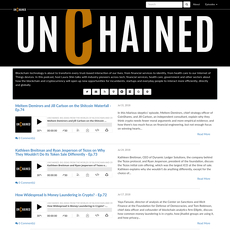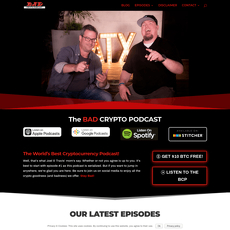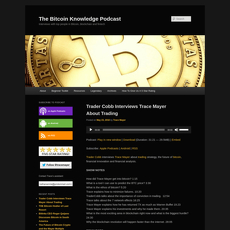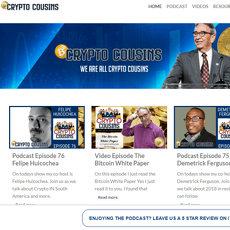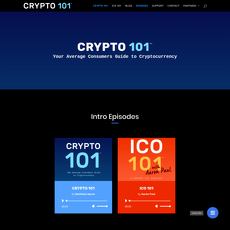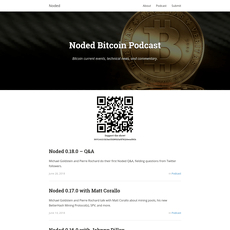The Bitcoin Game Review
The Bitcoin Game
soundcloud.com
The Bitcoin Game SoundCloud Review Guide: Everything You Need to Know (With FAQ)
Ever wonder if there’s a Bitcoin podcast that actually makes you smarter without wasting your time? If you’ve been burned by hype, clickbait, or dead feeds, you’re not alone. In this guide, I’m looking at The Bitcoin Game on SoundCloud—what it is, whether it’s worth a spot in your queue, and how to listen in a way that respects your time and attention.
You’ll walk away knowing exactly who this podcast is for, where to start, and what to expect from the content and cadence—so you can press play with confidence.
The problems most listeners face before picking a Bitcoin podcast
Picking a Bitcoin podcast is tougher than it looks. The space is crowded and a lot of shows sound the same on the surface—but differ wildly in value. Here’s what trips most people up:
- Hype overload: Too many shows lean on buzzwords, price talk, and hot takes instead of useful insight.
- Time sink: Long episodes aren’t the problem—wasted minutes are. Most of us only have commute or workout time to spare, so every segment needs to earn its keep.
- Shallow content: Guests with big profiles don’t always give you practical takeaways. You want real builders and operators who teach, not just promote.
- Irregular feeds: Nothing’s worse than finding a show you like…and realizing the last new episode was months ago.
- Jargon walls: Bitcoin has its own language. If a show can’t make complex topics approachable, it costs you more energy than it’s worth.
Why is this such a common pain point? Podcast listening keeps growing—Edison Research’s The Infinite Dial 2024 shows that nearly half of Americans 12+ now listen monthly—so there’s more choice than ever. And with attention at a premium, listeners are choosy. The right show should feel like a conversation that pays you back in clarity, not confusion.
Good Bitcoin podcasts respect your time. Great ones make you smarter. The trick is telling them apart—fast.
Promise: I’ll help you decide fast—and listen smarter
Here’s what you can expect from this review:
- Format, tone, and audience fit: A clear picture of the show’s style so you can tell if it matches your goals.
- Smart starting points: The best types of episodes to begin with, depending on your level and interests.
- How to listen anywhere: Simple steps to follow on SoundCloud—or in your favorite podcast app—without fuss.
- Honest pros and cons: So you know the strengths and the trade-offs before you hit play.
No fluff. Just what you need to choose—and use—the show intelligently.
How I review podcasts
I focus on signal over noise, consistency, and whether a show actually teaches you something you can use—beyond headlines and price chatter. To keep it fair and practical, here’s the simple checklist I use:
- Signal quality: Are the conversations educational, or just entertaining?
- Guest substance: Builders, researchers, and operators tend to produce durable insights. That’s what I look for.
- Cadence and reliability: Is the feed active enough to follow, or so sporadic you’ll forget it exists?
- Clarity vs. jargon: Complex topics are fine; unexplained jargon isn’t.
- Episode ROI: Do you walk away with a clearer mental model, a new tool, or a better question to ask next time?
- Listening UX: Works smoothly on SoundCloud and via RSS in common podcast apps? Download options? Notifs?
I also spot-check older episodes to see if insights age well. Bitcoin changes fast, but the best shows still feel useful a year later. That’s a strong sign you’re dealing with thoughtful content, not trend-chasing.
Ready to see whether The Bitcoin Game fits that bill? Up next: what it is, why it stands out, and who will get the most from it—so you can hit play with zero second-guessing.
What is The Bitcoin Game? Quick facts and why it stands out
The Bitcoin Game is a long-running, interview-first Bitcoin podcast hosted on SoundCloud. It’s calm, curious, and focused on education rather than headlines. Think of it as a quiet, thoughtful conversation with people who actually build or research Bitcoin—wallet engineers, Lightning contributors, privacy advocates, miners, security pros, and industry veterans.
Why it stands out? The conversations are unhurried and respectful, so guests have space to explain the why behind what they build. That’s rare in a market that often chases price chatter. Surveys like Edison Research’s The Infinite Dial consistently show “learning new things” as a top reason people choose podcasts; this show leans into that with depth that feels timeless months (or years) later.
- Format: Long-form, one-on-one interviews (no panel chaos, no hot takes)
- Focus: Bitcoin builders, ideas, security, infrastructure, and the human side of shipping code
- Vibe: Friendly, inquisitive, low-noise
- Length: Often an hour or more, optimized for understanding, not soundbites
- Cadence: Irregular—episodes arrive when they’re ready (quality over calendar)
- Platform: Lives on SoundCloud, available in most podcast apps via the feed
“If Bitcoin is signal surrounded by noise, this show is where the noise gets turned down so the builder’s voice can be heard.”
Host and format at a glance
Hosted by Rob Mitchell, the tone is curious but grounded. You’ll hear questions that invite real answers—how a Lightning tool actually works, why a security choice was made, where a wallet UX breaks for new users, or what a miner sees on the ground. Episodes often feel like mini-briefings you wish you’d heard before trying a new tool.
Typical patterns you’ll notice:
- Clear context-setting: Guests explain their role and what problem they’re trying to solve.
- Practical takeaways: Conversations often surface trade-offs (privacy vs. usability, speed vs. safety) without preaching.
- Evergreen feel: Less about market cycles, more about how Bitcoin’s plumbing and practices evolve.
Real-world example topics you’ll come across:
- Lightning reliability, channel liquidity, and operational pitfalls
- Cold storage design, backups, multisig, and user mistakes to avoid
- Mining realities—costs, energy, and how incentives shape behavior
- Privacy tooling and the UX gaps that keep people from using it correctly
Release cadence and episode length
This is not a daily news feed. Episodes drop when there’s a strong conversation to publish, and they tend to run long enough to unpack the technical and human layers. For educational podcasts, that’s a feature, not a bug—longer formats are linked with higher perceived value among listeners seeking to learn (a trend echoed across industry research).
- Expect variability: Some months bring multiple episodes; other times it’s quiet.
- Plan your queue: It’s ideal for focused sessions (commutes, walks, flights) or split across a couple of sittings at 1.25–1.5x speed.
If you’ve ever finished a short crypto show feeling like you got a headline but not the “how,” this format fixes that. You’ll feel less rushed and more confident about the details that actually matter.
Where it lives and how to access it
The home base is SoundCloud. You can listen instantly in your browser, inside the SoundCloud app, or by pulling the feed into your podcast player:
- SoundCloud: Stream here — https://soundcloud.com/the-bitcoin-game
- Follow + alerts: Hit Follow on SoundCloud and toggle notifications so you don’t miss the next drop.
- Podcast apps: Search “The Bitcoin Game” or paste the SoundCloud RSS feed into your app if needed.
I keep a short list of recent episodes bookmarked for flights because the interviews reward attention—there’s usually one smart idea you can put to work right away, whether that’s improving your backup process or finally understanding why a Lightning channel behaved the way it did.
Curious what it actually feels like to listen—and whether you’ll love the tone and topics? Let’s look at the listening experience next…
The listening experience: tone, topics, and who it’s for
If you’re tired of “breaking news” that breaks your attention, this show feels like a quiet conversation at a small table—no shouting, no charts flying, just a builder explaining what actually matters. It respects your time and your brain. The host lets guests think out loud, and you get to follow their mental models instead of chasing headlines.
“In Bitcoin, signal beats noise. Your listening should do the same.”
The vibe is calm, curious, and practical. You’ll hear stories from people who’ve shipped code, run nodes, wrestled with hardware, or kept infrastructure humming when nobody’s watching. That’s where the real lessons are.
Topics you can expect
Less price talk, more “how does this actually work and why should I care?” Expect conversations that get into:
- Bitcoin fundamentals: UTXOs, fees, mempool behavior, and why address reuse is a problem.
- Developer work: how features get proposed, reviewed, and shipped; the tradeoffs behind “simple” UX decisions.
- Infrastructure: what it takes to keep nodes, explorers, and services reliable under real-world load.
- Mining: capex/opex realities, firmware choices, cooling, and grid relationships like curtailment agreements.
- Privacy: coin selection, coinjoin concepts, heuristics you should assume adversaries use, and ways to reduce your footprint.
- Lightning: channel liquidity, routing reliability, fees, watchtowers, and the human challenges of running a node.
- Hardware and security: PSBT workflows, air-gapped signing, multisig setup mistakes, backups, and disaster planning.
- Human stories: how a project survived its first big outage, why a dev changed their mind on a design, what keeps maintainers motivated.
Real examples you’ll hear: a wallet engineer walking through a PSBT step-by-step and why users still mess up backups; a miner explaining how heat and power contracts change margins; a Lightning operator talking about channel hygiene and why “just open more channels” can backfire.
Why this format works: audience studies consistently show people choose podcasts to learn and to go deeper than headlines (see Edison Research’s long-running listener surveys). Long-form interviews help you build accurate mental models, and research on playback speed suggests you can listen at 1.25–1.5x without losing comprehension—great for the longer episodes while keeping nuance intact.
Is it beginner-friendly?
Yes—if you’re curious and okay pausing to Google a term now and then. It speaks like you’re smart, not like you’re fragile. If you already know what a seed phrase is or have sent a Lightning payment, you’re set. Completely new? You can still enjoy it—just start with topics you recognize and recent conversations where the guest is known for teaching.
- If you’re early in your journey: look for terms you’ve heard—“security,” “privacy,” “Lightning”—and build from there.
- If you’re experienced: you’ll appreciate the nuance, from fee market dynamics to multisig caveats most guides skip.
There’s no hand-holding, but there is patience. You’ll rarely feel rushed past the “why” behind the “what.”
Production quality and pacing
Audio: generally clean, with the occasional remote-call texture you’d expect from builder interviews. Levels are sensible, clipping is rare, and you won’t fight background noise on a commute.
Pacing: unhurried and linear. Guests get room to finish thoughts, then the host nudges with smart follow-ups. That rhythm matters; slower, structured conversations reduce cognitive load and help you remember what you just learned without re-listening.
Structure: minimal fluff, minimal ads, and a clear arc from context → challenge → solution → takeaways. It’s easy to drop in mid-episode, pause, and pick up later without losing the thread.
Who it’s for (and who will love it)
- Builders and tinkerers: you’ll get the gritty details—tradeoffs, tooling, and where the bodies are buried.
- Security-minded users: practical ways to level up backups, signing, and threat modeling without fear-mongering.
- Professionals exploring Bitcoin: product leaders, founders, engineers—anyone who wants signal over sentiment.
- Privacy-conscious listeners: thoughtful takes on realistic privacy, not magic-wand promises.
- Miners and infra folks: shop talk that maps to the real constraints you live with.
If that sounds like your kind of listening room, the only question left is simple: how do you pick the right first episode without scrolling for 20 minutes? In the next section, I’ll show you the fastest way to spot perfect “starter” conversations for your goals—beginners, builders, or investors—so you can hit play with confidence.
Where to start: smart entry points and standout episode types
You don’t need to binge the entire back catalog to get value. Think of this show like a well-organized library: pick a shelf that fits your goals and start there. The conversations are mostly evergreen, so the “best” first episode is the one that speaks to what you want to learn today.
“Pick curiosity over clicks. Episodes that feel ‘slow’ at first often become the ones you remember.”
Quick note: podcast research from Edison Research shows most of us start with recent episodes and use 1.2–1.5x speed to make long-form shows fit our day. That’s the right move here too.
For beginners: ease into it
If you’re still building your Bitcoin foundation, aim for clear, recent conversations with educators or titles that scream “practical.” Here’s how I spot easy wins fast:
- Scan titles for keywords: “intro,” “basics,” “security,” “self-custody,” “wallet,” “Lightning overview,” “keys,” “seed phrase.”
- Choose one problem to solve: Examples:
- “How do I store BTC safely?” → Look for episodes discussing hardware wallets, multisig, backups.
- “What is Lightning?” → Hunt for Lightning overview or a guest who builds Lightning tooling.
- “Privacy 101?” → Titles with privacy, CoinJoin, or UTXO management.
- Listen with intent: Take one note per 10 minutes. Summarizing in your own words boosts retention (a classic tip from learning science that just works).
- Use the 10-minute test: Give a promising episode 10 minutes at 1.25x. If you’re learning, keep it. If not, switch. No guilt.
For builders and tinkerers
Love rolling up your sleeves? This feed has gold for you—conversations where builders unpack trade-offs and real-world constraints. Look for:
- Developer-centric titles: “Lightning,” “miniscript,” “PSBT,” “descriptor,” “nodes,” “firmware,” “hardware,” “open-source,” “privacy engineering.”
- What to listen for:
- Implementation details: How they handle performance, UX, and attack surfaces.
- Roadmaps and constraints: What’s next and what’s hard (super useful if you’re planning to build on top).
- Lessons learned: Mistakes saved me more money and time than any “alpha” ever did.
- Action idea: Pause to replicate one concept (spin up a pruned node, try a testnet Lightning channel, export and inspect a PSBT). Turning a single insight into a weekend project compounds quickly.
For investors and curious skeptics
Want signal on where Bitcoin’s infrastructure is heading—without trading noise? You’ll get it by choosing episodes around systems, not speculation.
- Hunt these themes: “custody,” “multisig,” “infrastructure,” “mining,” “energy,” “security,” “fee market,” “onboarding,” “enterprise,” “wallet UX.”
- What you’ll learn:
- Risk frameworks: How institutions and pros think about operational security and custody design.
- Where the bottlenecks are: User experience, liquidity, regulation, wallet interoperability.
- Macro-in-context: How real builders prioritize in bear vs. bull markets.
- Smart filter: If the title sounds timeless (keys, security, infrastructure), it probably is. These age well and are worth bookmarking.
Pro tip: finding the right episodes fast
Here’s my quick-search workflow to hit the ground running on the SoundCloud hub:
- Start here: soundcloud.com/the-bitcoin-game
- Use your browser’s find: Press Ctrl/⌘+F and search for topic terms like:
- privacy, wallet, multisig, Lightning, mining, hardware, security, node
- Skim descriptions first: Look for guest bio, two or three core topics, and any linked repos or docs. If the description mentions code, demos, or a specific feature, it’s probably dense with learnings.
- Queue two episodes at once: One “now” (today’s goal) and one “stretch” (slightly more advanced). This keeps you moving without stalling when the first one ends.
- Speed and segment: Long-form shines when you chunk it:
- 1.25–1.5x for narrative and background
- 1.0–1.25x when they get technical or list steps
If you like little systems, here’s a simple “1–3–1” recipe that works wonders:
- 1 primer episode to ground your basics
- 3 episodes tightly aligned to your focus (e.g., Lightning, security, or mining)
- 1wild-card conversation outside your lane to keep your thinking fresh
Ready to make this easy to follow on your phone and across devices without missing new releases or your spot mid-episode? I’ve got a frictionless setup that takes two minutes—want it?
How to listen, subscribe, and get the most from The Bitcoin Game
Here’s the fastest way to lock The Bitcoin Game into your routine so you actually learn from it—without babysitting feeds or missing new drops.
“In a world of 24/7 noise, your attention is the rarest currency.”
SoundCloud basics
The show’s home base is SoundCloud. Set it up once and you’re set:
- Open the show page: https://soundcloud.com/the-bitcoin-game
- Click Follow, then tap the bell and choose All notifications so you get a ping when new episodes land.
- On mobile, use the Download arrow for offline listening (perfect for flights, subways, or spotty Wi‑Fi).
- Create a playlist called “Bitcoin Game — Must Listen” and add episodes you want to queue for the week. It keeps you focused.
- Skim the episode description before you hit play; the links often point to docs, repos, or talks you’ll want later.
Podcast apps and RSS
If you’d rather keep everything in your podcast app, do this:
- Search for “The Bitcoin Game” in Apple Podcasts, Spotify, Overcast, Pocket Casts, or Podcast Addict.
- If it doesn’t show up for you, grab the show’s RSS feed from the SoundCloud page (look for “...” or the About section), then:
- Overcast: Add URL → paste the RSS.
- Pocket Casts: Discover → Paste RSS feed.
- Podcast Addict (Android): + → RSS feed → paste.
- Turn on auto-download for new episodes so they drop into your queue without you thinking about it.
Listening tips that actually work
This show leans long-form and thoughtful. A few tweaks will help you keep up and retain more:
- Use 1.25–1.5x speed: Research from UCLA found that students comprehend just as well at up to 2x speed for lectures, with comprehension dropping beyond that. 1.25–1.5x hits the sweet spot for most interviews without losing nuance.
- Trim the dead air: Overcast’s Smart Speed and Pocket Casts’ Trim Silence remove gaps—saves minutes per episode.
- Boost clarity: Turn on Voice Boost (Overcast) or Volume Boost features for cleaner audio in noisy environments.
- Bookmark the gold: Drop a timestamp note when a guest mentions a tool, BIP, or repo. Apps like Snipd or Airr let you save clips and send highlights to Readwise/Notion.
- Practice retrieval: Jot a one-sentence takeaway after each listen. The “testing effect” (Roediger & Karpicke, 2006) shows recall jumps when you quickly restate what you learned.
- Pair with a routine: Commute, walk, gym—stack it with something you already do to stay consistent.
Show notes and transcripts
Expect solid episode descriptions with useful links. Full transcripts aren’t guaranteed, but you’ve got options:
- Check the SoundCloud description—many episodes include references and URLs the guest mentions.
- Use your app’s transcript feature if available, or let Snipd/Airr auto-transcribe key moments for later review.
- Save sources (wallets, repos, papers) into a notes app as you listen—two taps now saves an hour of backtracking later.
A quick setup that pays off
- Overcast users: Follow → Enable Smart Speed + Voice Boost → Auto-download on → Set default speed to 1.3x.
- Pocket Casts users: Subscribe → Trim Silence + Volume Boost → Auto-download → Create a filter for “Bitcoin Game” so it never gets buried.
- SoundCloud only? Follow + Bell → Offline downloads → One playlist for “Now” and one for “Later.”
If you listen this way, the show fits neatly into your week and you’ll actually remember what you heard. Now the real question: is all this worth your time? Keep going—I’m about to be brutally honest about the strengths, the gotchas, and who should absolutely listen next.
Is it worth your time? Pros, cons, and who should listen
Short answer: yes—if you want real Bitcoin conversations with the people who build, break, and improve it. This is the kind of long-form show that still teaches you something a year later because the focus is on fundamentals and real-world lessons, not hype.
What it does well
- Depth that compounds: You’ll hear builders unpack trade-offs (like RBF vs. CPFP for fee management, or when to prefer single-sig over multisig) with clear reasoning. That kind of nuance becomes more valuable over time, not less.
- Low noise, high signal: No whiplash from price chatter or altcoin rotations. If you want to understand how Lightning routing, hardware wallet UX, or mining economics actually work, this is your lane.
- Practitioner perspective: Expect practical war stories—cold storage mistakes to avoid, supply-chain threats in hardware, or how a node implementation handled a breaking change. These are the stories that help you make better decisions.
- Evergreen value: Long-form interviews tend to age well because they focus on principles and architecture. Edison Research has repeatedly noted that podcast audiences gravitate to educational content and trust shows that invest in deeper interviews—exactly the vibe here.
Rule of thumb: if a Bitcoin idea still makes sense a year from now, it’s worth an hour of your time today.
Where it can frustrate
- Irregular release schedule: Great for quality control, not great if you want a predictable weekly drop. I keep it followed in my app so new episodes quietly appear in my queue.
- Longer episodes: Expect extended conversations. The upside is depth; the trade-off is time. The good news? Research on time-compressed audio shows that most people retain understanding at 1.25–1.5x speed about as well as at 1x, especially for educational content—so don’t be shy about speeding it up.
- Occasional technical heavy lifts: Some chats get into protocol details or hardware constraints. If you’re newer, pick topics you recognize, skim the description first, and pause to look up unfamiliar terms. It pays off.
Best fit
- Bitcoin-curious professionals: Product managers, founders, and engineers who want the “why” behind design choices, not just headlines.
- Dev-leaning listeners: If you tinker with nodes, Lightning, or wallet tooling, the architectural discussions and postmortems will feel like free mentorship.
- Security-minded users: People serious about self-custody, key management, and privacy will appreciate the first-principles approach.
- Operators and builders: Miners, custody providers, and infrastructure folks who want to hear how others tackle real constraints—energy, latency, fees, supply chain, regulation—without fluff.
Who might skip
- Daily market chasers: If you want breaking news, price targets, or altcoin rotation ideas, this isn’t it.
- Sound-bite seekers: The format rewards patience. If you prefer tight 10-minute recaps, you’ll be happier elsewhere.
- Pure traders: No signals, no charts—just the stuff traders often circle back to when they decide to truly understand Bitcoin.
Here’s a quick way to decide: do you want to hear a wallet engineer explain fee bumping strategies with concrete examples, a miner talk through curtailment contracts and power markets, or a hardware designer break down secure element threats? If that sparks curiosity, you’ll get a lot out of The Bitcoin Game on SoundCloud.
Still on the fence? Wondering how often new episodes arrive, whether there are transcripts, or how to subscribe in your favorite app without fuss? I’ll answer those in the next section—want the fastest path to your first great listen?
FAQ: The Bitcoin Game (SoundCloud) — quick answers before you hit play
I’ve rounded up the questions I’m asked most, with straight answers so you can decide in minutes, not hours.
What is The Bitcoin Game and who hosts it?
It’s a long-form Bitcoin interview podcast hosted by Rob Mitchell, available on SoundCloud and most podcast apps. Expect thoughtful, unhurried conversations with builders, researchers, and industry veterans who actually ship and secure Bitcoin tools.
Is it good for beginners?
Yes—if you’re curious and willing to stick with longer chats. I recommend starting with recent episodes or topics you already recognize (wallets, Lightning, mining). If you’re totally new to Bitcoin, a quick primer first will make the interviews click faster.
Tip: Listening at 1.25x–1.5x works well for conversational shows without losing key details, especially when you pause to note terms you want to look up later.
How often are new episodes released?
Irregularly. Think “when a strong interview is ready,” not a weekly news cadence. The upside is better signal; the trade-off is no strict schedule.
What topics does it cover?
Substance over headlines. You’ll hear about:
- Bitcoin tech and protocol fundamentals
- Lightning implementations and real-world node ops
- Privacy best practices and threat models
- Hardware, wallets, security, and custody trade-offs
- Mining, infrastructure, and builder stories
It’s light on price chatter and hype, which helps episodes age well.
How do I listen and subscribe?
You’ve got options:
- SoundCloud: Go to soundcloud.com/the-bitcoin-game, hit Follow, and enable notifications. Stream in-browser or in the app.
- Podcast apps: Search “The Bitcoin Game” in your player. If it doesn’t show up, paste the SoundCloud feed link (most apps support it) and it’ll land in your queue like any other show.
Quick win: Add a couple of recent episodes to your queue and mark them “Next Up” so you don’t forget to try it.
Are there transcripts?
Sometimes you’ll find detailed notes on episode pages, but full transcripts aren’t guaranteed. Check the description on SoundCloud or use your podcast app’s transcript feature if it’s available. When I want a written reference, I save key timestamps and quotes in my notes app for quick recall.
Does it cover altcoins and trading?
No. It’s a Bitcoin-first show. You won’t get trade calls, altcoin rotation talk, or daily market recaps. That’s exactly why a lot of listeners stick with it.
Conclusion
If you want a no-nonsense Bitcoin podcast that prizes signal over noise, this is an easy recommendation. Start with a recent episode that matches your interests, follow on SoundCloud to keep it on your radar, and let your podcast app handle the long-form format on your schedule. I’ll keep tracking it at cryptolinks.com so you always know if it’s still worth your time.



